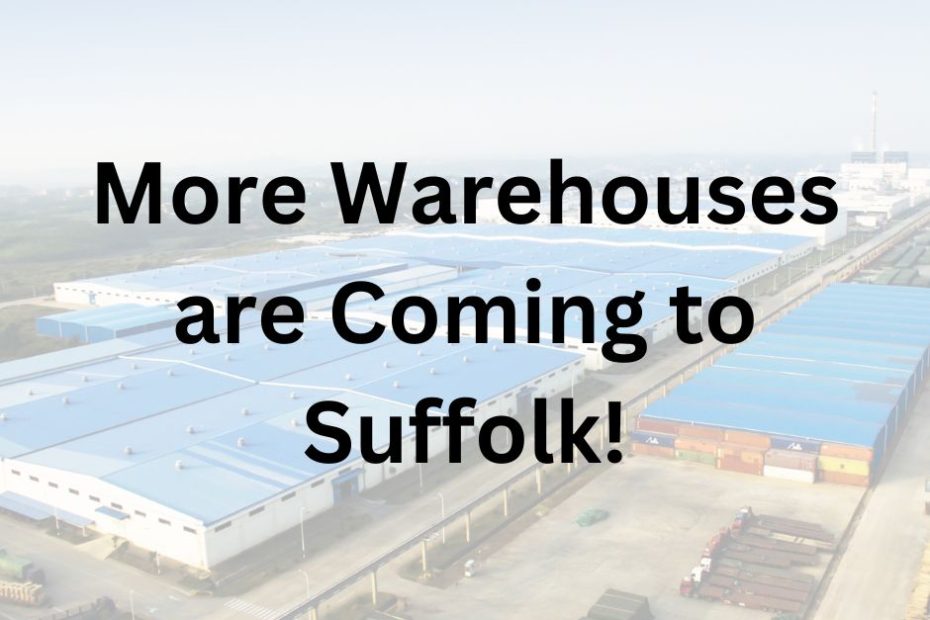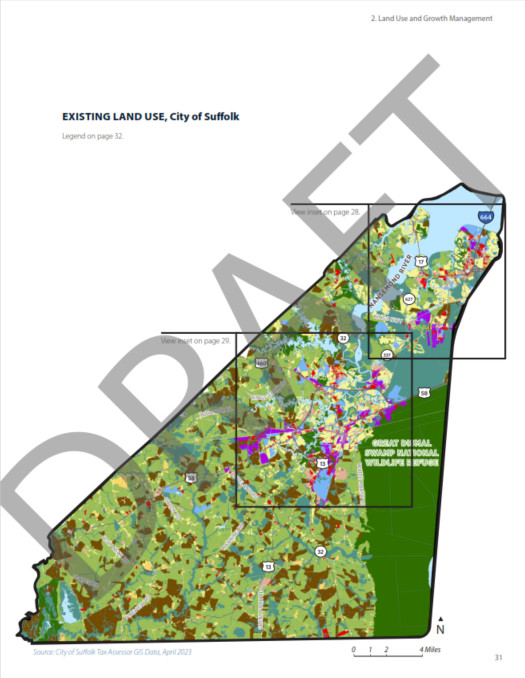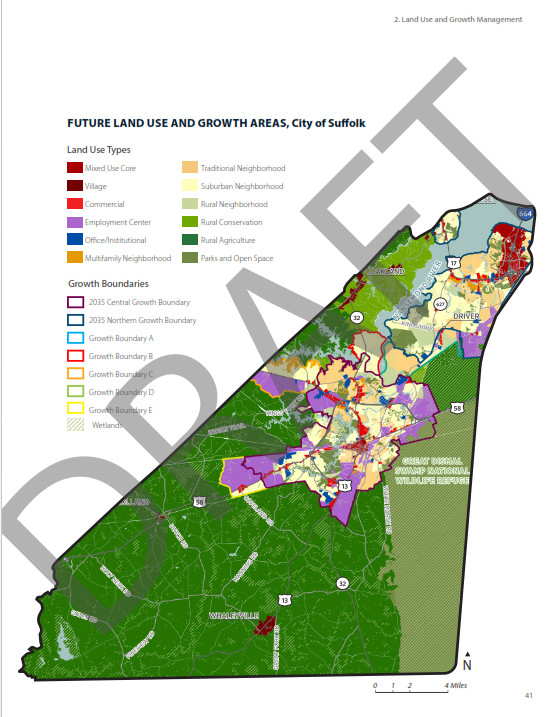The new 2045 Comprehensive Plan draft drastically increases the Growth Area in Suffolk, by enlarging the existing one by almost 25%, which is unprecedented in the history of Suffolk’s comprehensive plans. The Growth Area is important because it lets developers know in which areas the city (not necessarily the citizens) wants to see more development.
In addition to expanding the Growth Area, our city managers have created a Future Land Use Map. This map shows what type of development (residential, commercial, industrial, etc.) the city would like to see in different areas, which is often very different from the actual, current zoning. If you haven’t looked at your home’s location, you should check it out and see what will be changing near you.
If this plan is approved as it is, Chuckatuck and Sleepy Hole will be seeing an increase in suburban residential development. Whaleyville is about to see an increase in warehouses. Cypress and Nansemond will see increases in both suburban residential and warehouses, while Holy Neck is about to take the brunt of the expansion with enormous increases in both warehouses and suburban residential developments. Holy Neck residents: the city can’t commit to building a rec center in your borough in the next 5 years, but they can guarantee you will get more warehouses!
The term ‘Employment Center’ is now the Land Use Type name they want to use for areas where city managers want to allow warehouses and manufacturing. If you are wondering how much these ‘Employment Center’ areas are set to expand, you will be disappointed to know that the city hasn’t measured it. When specifically asked, what is the area of all land currently zoned industrial as well as the area of the proposed ‘Employment Center’ land use category, the city planner responded that the area in the plan ‘has not been calculated in this way’ and that this isn’t ‘an engineering project’.
The Planning Department stated during a comprehensive plan briefing at the February 7th City Council meeting (mark 19:47) that, “You want to make decisions based on good data.” So why have they not used basic metrics like area? Land is a limited resource. How can you plan without measuring how much we currently have zoned for industrial and how much we want in the future?
Maybe they don’t want to measure because they don’t want to tell us how much area they are expanding for warehouses. (It is about four times the current industrial-zoned areas, by an eye-ball measurement, and sadly, that is the best info we were able to get off the provided maps.)
Interestingly, listed as THE TOP, #1, Objective and Action in the ECONOMIC section of the new comprehensive plan, is this plan to build a publicly owned commerce/industrial park:
E.1 Attract and retain employment-generating industries. (p. 80, 2045 Comprehensive Plan Draft)
E.1.1 Develop a publicly owned commerce/industrial park to promote diverse industry growth in support of higher-paying jobs. The site should be aligned with the Virginia Business Ready program (VBRSP) to leverage the visibility and funding opportunities available at the state level. VBRSP grants are awarded to assist with the costs of site assessment and work (rezoning, surveying, infrastructure improvements, etc.) necessary to increase a site’s development readiness.
City planners won’t measure the area they want to expand for warehouses and logistic centers, but they know they want to develop a publicly owned commerce/industrial park? Where is this park going to be? How big will it be? It is hard to imagine they spent two years on this draft, list this as the #1 economic priority and don’t know what they are planning. Where is the transparency?
They will also tell you that zoning and land use type are not the same. However, the wording in the 2045 Comprehensive Plan says differently. Check out the sections below that clearly talk about changing the zoning to match the Future Land Use map.
OBJECTIVES AND ACTIONS (p. 64, 2045 Comprehensive Plan Draft)
L.1 Focus development in designated Growth Areas and promote development that is consistent with the Future Land Use and Growth Areas Map.
L.1.1 Review development proposals for consistency with the Future Land Use and Growth Areas Map, the Future Land Use Types described and mapped in this chapter, and the Guiding Values, Land Use Principals, Objectives and Actions adopted in this plan.
2.1.2 Review and revise current development regulations, including the Unified Development Ordinance (UDO) and the zoning map, to improve compatibility with the comprehensive plan.
Priority areas for consideration include:
• Downtown Mixed Use Core & Adjacent Neighborhoods
• North Suffolk Mixed Use Core
• Opportunities to Promote Affordable Housing
• Opportunities to Promote Master-Planned Traditional Neighborhood Developments
• Rural Villages/VC Zoning District
• Consistency with Use District and Place Type Definitions and the Future Land Use Plan
Integration into City Operations and Processes
Regulatory Updates (p. 153, 2045 Comprehensive Plan Draft)
Revisions to the City’s zoning code and other regulations should be made in accordance with the plan. The process for updating the zoning code will be led by City Staff in collaboration with the Planning Commission and will be determined following the adoption of the plan. This will provide the City with the regulatory authority to enforce recommendations in the Future Land Use Map and promote other desired outcomes expressed through the plan’s actions.
Private Development Decisions (p. 152, 2045 Comprehensive Plan Draft)
Property owners and developers should consider the principles, objectives, and actions in the plan in their land planning and investment decisions. Public decision-makers will be using the plan as a guide in their development deliberations such as zoning matters and infrastructure requests. Property owners and developers should be cognizant of and complement the plan’s recommendations.
If you don’t like what you see in the Land Use map, don’t count on the process of rezoning with a public hearing to help you fight it. The city is being perfectly clear that they want to streamline this process. They want to make it easier for developers to look at the map and, regardless of the zoning, allow them to develop based on the Land Use Map. The city is helping developers rezone the land with this document. This is yet more evidence that this new plan is written with the developers in mind and not the citizens.
This can not be stressed enough. This new comprehensive plan is designed to make it easier for developers to build even when it doesn’t match the zoning. If you do not want what is proposed in the Land Use Map, NOW is the time to act and let City Council know. If you don’t want to see four times the amount of warehouses we already have, you need to tell them now. If you are waiting to give your input during a future rezoning application, it will be too late!
Let City Council know what you think about this new growth area: council@suffolkva.us
Michael D. Duman, Mayor
mayor@suffolkva.us
Phone: 757-514-4009
Lue R. Ward, Jr., Vice Mayor
(Nansemond Borough)
nansemond@suffolkva.us
Phone: 757-377-6929
Shelley Butler Barlow,
Council Member
(Chuckatuck Borough)
chuckatuck@suffolkva.us
Phone: 757-346-8355
Leroy Bennett, Council Member
(Cypress Borough)
cypress@suffolkva.us
Phone: 757-407-3750
Timothy J. Johnson, Council Member
(Holy Neck Borough)
holyneck@suffolkva.us
Phone: 757-407-0556
Roger W. Fawcett, Council Member
(Sleepy Hole Borough)
sleepyhole@suffolkva.us
Phone: 757-377-8641
John Rector, Council Member
(Suffolk Borough)
suffolk@suffolkva.us
Phone: 757-407-1953
LeOtis Williams, Council Member
(Whaleyville Borough)
whaleyville@suffolkva.us
Phone: 757-402-7100


